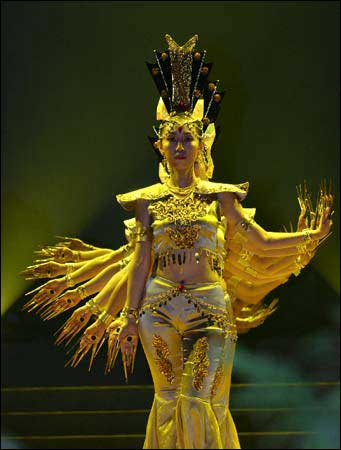'Thousand-hand Bodhisattva' sued for infringement
By Coldness Kwan (Chinadaily.com.cn)
Updated: 2006-09-30 16:21
"Thousand-hand Bodhisattva", a dance show performed by 21 deaf-mute artists
from the China Art Troupe of Disabled Persons, has enjoyed critical acclaim from
audiences both at home and abroad ever since going on tour following its
thrilling debut on the 2005 CCTV Spring Festival Gala Show, but is currently
being sued for copyright infringement, according to the Changqing Evening News.

A TV grab shows the 21 deaf-mute
dancers perform "Thousand-hand Bodhisattva".
[sina] |
Mao Difang, 71-year-old retired dance director, filed a lawsuit suing Zhang
JigangŁ¬head of the Troupe of the General Political Department of the China
Liberation Army and China Art Troupe for Disabled Persons for infringement. Mao
is asking for one million yuan in compensation. .
The dance show uses the dancers to recreate the image of the Bodhisattva, a
traditional Chinese goddess of love and well being who has one thousand hands,
with an eye in each hand. The 21 dancers line up in a straight line and use
their arms to recreate the goddess' image on stage.
Mao said her version of Bodhisattva, named 'Ji xiang tian nv' (auspicious
goodness) was created in 1987 and was performed by 12 dancers. It was nicknamed
the 'thousand-hand Bodhisattva' during rehearsal.
Mao claims the defendant adopted the same theme and the same costumes for the
dancers, who wear long nails and have eyes on their hands. Mao also used photos
to support claims of other similarities including music, structure, props and
even the male to female ratio of the dancers.
However the 'thousand hand Bodhisattva' registered for copyright last April,
three months after its debut on CCTV, which angered Mao. "Some of those who are
in the dance field are rather disrespectful to their mentors," said Mao. "One is
allowed to stand on the shoulders of mentors and climb, but they must admit they
are on their mentors' shoulders."
"It is difficult to tell if something is plagiarized in the dance field," Bi
Fuchun, vice president of Chongqing Dancers Association said. Bi complained
about the legal lapses in dance copyright - "how much of the movement, image and
design from two pieces of dance has to be the same in order to be classified as
plagiarized?" he asked.
The court has agreed to hear the case.
|